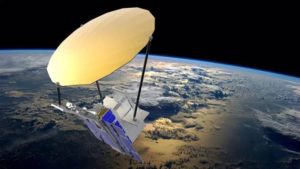The company’s satellite technology revolutionizes data transfer volume and speed, compared with other small-scale satellites. Its nanosatellite antennas can now enable high-speed communication with X100 the volume of other nanosatellites
The company is currently closing its series B financing round totaling $6.25 million
This is the first investment for Cockpit Innovation, El Al Group’s hi-tech investment arm, following announcing its partnership with Boeing, focusing on aviation and aerospace
The startup NSLComm, which develops nanosatellite technology for high volume communications, is currently closing its series B funding round, reaching $6.25 million in total. The round is led by strategic investors such as JVP, Liberty, OurCrowd, Hawk GF, and Cockpit Innovation of the El Al Group that has recently announced its partnership with Boeing and Lufthansa to support startups and innovative technologies focusing on the aviation and aerospace verticals. This is Cockpit’s first investment made within its new collaborative framework. The funding round will enable NSLComm to develop and build two satellites for future launching, in addition to the first satellite launch into outer space, scheduled for November 2018.
Since its inception in 2015 by Dr. Raz Itzhaki, Daniel Rockberger, and Danny Spiritus, NSLComm has focused its work on developing trailblazing Israeli technologies for satellite communications. Current nanosatellite technologies only allow communication rates of less than 10 Mbps in low orbit, which is used for observation, scientific research, and other applications outside communications. NSLComm’s innovative nanosatellite technology now offers data transfer rates of 1 Gbps, 100 times faster than current capacities available on the market.
This game-changing advancement will enable a wide variety of uses, including in-flight connectivity, backhauling connectivity, IoT networks across a global framework of satellites, and additional uses in the governmental, commercial, and private sectors.
Satellite communications is one of the world’s key infrastructures, propelling forward the rapidly evolving field of data communications, which enables the capacities of central technologies – from weather forecasting, through high-speed Internet and cellular networks, to commercial uses for diverse global players.
Satellites are commonly classified into two main categories, the large Geostationary Operational Environmental Satellites (GEO), and the smaller Low Earth Orbits (LEO). GEO satellites orbit the Earth at high altitudes to offer broad data ranges and rapid transmission, yet the cost of their building, launch, and operation is immensely high. LEO, on the other hand, are small-scale satellites circling in low Earth orbits that cost much less, but are also limited in their data capacity and communication rates.
NSLComm nanosatellites offer a breakthrough in transmission rates currently available in the small-scale satellites class. Owing to the design and structure of their extremely flexible antennas, they can be folded to take-up extremely low volumes during launch into outer space, and are programmed to open up and unfold back into their full length upon activation in space (the antennas “remember” their original form and shape). This way, the company can offer cost-effectiveness, with high-speed satellite communications services at drastically reduced prices and extremely higher rates than any other player in the field.

Dr. Raz Itzhaki, Co-Founder and CEO of NSLComm: “We arrived at the idea for the company out of our understanding that the satellite market is in dire need for sophisticated technology, offering high-speed communications over small-scale satellites. Our antenna innovation will revolutionize the way in which fast data is transmitted, offering advanced applications for a wide variety of uses – governmental, civilian, and commercial. For example, if a global commercial player must now rely on external communication networks due to the astronomical costs of launching “its own” satellite, NSLComm’s solutions allow it to launch a group of broadband nanosatellites that generate the rate of data exchange it requires, and this can be done cost-effectively at an affordable price.”
Henry Chen Weinstein, Cockpit CEO: “Cockpit is entering its third year of operations, and we are continuously expanding the technological verticals that we want to reinvent, together with trailblazing startups. NSLComm’s technology aspires to be game-changing for high-speed satellite communication in low Earth orbit. This technology holds massive potential for a wide range of applications and industries, which impact us all. We believe in the partnership forged between NSLComm and the Cockpit ecosystem, together with El Al, Boeing, and Lufthansa.”
NSLComm plans to launch its first satellite NSLSat1 in November 2018, using the PSLV launching vehicle in India. Three years only after its inception, the startup has already gained leading clients in Israel and the U.S.A. It has created partnerships with a variety of funding entities and venture capitals, including Cockpit of the El Al Group that invests in innovative startups in the field of aviation and aerospace in collaboration with aviation giants Boeing and Lufthansa.
About NSLComm
NSLComm was founded in 2015 by Dr. Raz Itzhaki, Daniel Rockberger, and Danny Spirtus. CEO Dr. Raz Itzhaki holds over two decades of experience in the nanosatellite market, including the Israel Aerospace Industries (IAI) nanosatellite department that he created in 2016. Daniel Rockberger, NSLComm Chief Engineer, has designed satellite systems for a range of IAI’s satellite launches, and has worked for NASA’s moon research mission. CTO Danny Spirtus has served in RaySat Broadcasting Corp in parallel roles in the past and as VP of R&D specializing in antenna technology. He also led the antenna and ground station R&D department at Gilat Satellite Networks. The company is based in Airport City, Israel, and employs a team of 18 people.
As the company gains rapid growth in its research and development, and as part of its marketing strategy focus map, which includes selling to international leaders and forging partnerships with satellite companies while working with governmental entities, NSLComm has brought Daniel Ben Dov on board, who previously served as Gilat’s VP of Defense and as an executive at Elbit Systems, to serve as its VP of Business Development and Sales. Also, NSLComm named Zvika Freidman, previously President and CEO of Alvarion, as its chairman.

